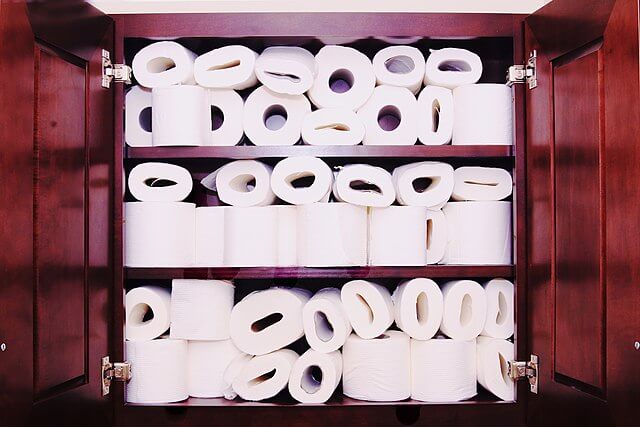
Hoarding of toilet paper during the Covid-19 pandemic shed light on its significance to the British public. However, an unexpected consequence of working from home emerged: a reduction in waste paper from offices, resulting in less recycled material available for making toilet rolls.
Ethical Consumer magazine conducted new research, revealing that the three major toilet paper brands have decreased the use of recycled paper in their products. The magazine argued that the use of virgin wood pulp for manufacturing tissues was contributing to deforestation, although this claim has been challenged by paper-industry advocates.
To encourage more sustainable choices, the consumer organization advised against purchasing Andrex, Velvet, Cushelle, Regina, and Nicky toilet paper brands due to their higher reliance on felled trees for their materials.
Kimberly-Clark, the manufacturer of Andrex, reduced the amount of recycled fibre used for tissue and personal care products to 19.3% in 2021, down from 29.7% in 2011. While overall fibre usage decreased from 3.53 million tonnes to 2.85 million tonnes, the majority of the reduction came from recycled fibres, with the use of virgin pulp falling only slightly.
Sofidel, responsible for producing Regina and Nicky toilet papers, also decreased the use of recycled fibres from 8.9% in 2019 to 7.3% in 2021.
Similarly, Essity, the maker of Velvet and Cushelle, reduced the amount of recycled paper in its products from 2.1 million tonnes in 2018 (40%) to 1.9 million tonnes in 2022 (36%), while slightly increasing the amount of fibre sourced from pulp.
Shanta Bhavnani, a researcher at Ethical Consumer and the author of the report, said: “There’s so much awareness now of the importance of trees in addressing climate change so it’s really disappointing to see the big toilet paper companies cutting their use of recycled fibres.
“But it’s encouraging to see the growth in the number of alternative toilet paper products, as it means consumers now have many more sustainable options.”
She referred to a report by the Natural Resources Defense Council, which highlighted the impact of logging in Canada’s boreal forests. Approximately 11.3 million hectares (28 million acres) of forest had been felled between 1996 and 2015, nearly the size of England.
Advocates of recycling argue that it is a more efficient and environmentally friendly alternative to cutting down trees for paper production. Recycling produces less wastewater and waste and requires less energy. The Environmental Paper Network, a global coalition of over 150 civil society organizations, points out that making tissue from recycled paper generates only one-third of the greenhouse gas emissions compared to using virgin wood.
However, Two Sides, a membership organization representing forestry, pulp, and paper manufacturers, countered the claim that paper production contributes to deforestation. They argued that all trees used for paper products are replanted, and European forests had grown from 2005 to 2015, with 74% of all paper used in Europe being recycled. Two Sides also asserted that virgin pulp is necessary to maintain the recycling chain since fibres degrade over time. On average, paper can be recycled 3.8 times, though some claim that fibres can last up to six times or more.
The companies mentioned in the report obtain virgin wood from certified schemes like the Forestry Stewardship Council (FSC). However, Ethical Consumer raised concerns about poor oversight and labelling issues in some of these schemes, such as “FSC mix” products originating from unaudited forests.
To promote environmentally responsible choices, Ethical Consumer recommended purchasing toilet rolls made from recycled paper or sustainably sourced bamboo pulp with no plastic packaging.
Gareth Lucy, Essity UK’s communications director, said that he was disappointed by the report because there had been a big drop in the availability of waste paper during the pandemic – “from the huge reduction in office paper waste as workplaces were closed, and the transition of household bills and documents from paper to online”.
He added that Essity had been researching how to make tissue from other sources such as wheat straw. “Essity has identified and developed ways to process new sources of recycled paper, such as from used paper towels and takeaway coffee cups, and has invested in a new state-of-the-art recycled paper facility that can process a lower grade of recycled fibre.”
In response to the report, Gareth Lucy, Essity UK’s communications director, expressed disappointment, citing the significant drop in waste paper availability during the pandemic.
A spokesperson for Kimberly-Clark shared their commitment to end the use of natural forest fibre by 2030 and emphasized that their UK operations rely on 77% fast-growing, farmed eucalyptus fibres.
“Of the remaining 23%, we’re working towards reducing them further through the use of innovative technology, for example using enzymes to give the tissue paper the necessary strength” the spokesperson said.
——————————————————————————
At Natural World Fund, we are passionate about stopping the decline in our wildlife.
The declines in our wildlife is shocking and frightening. Without much more support, many of the animals we know and love will continue in their declines towards extinction.
When you help to restore a patch of degraded land through rewilding to forests, meadows, or wetlands, you have a massive impact on the biodiversity at a local level. You give animals a home and food that they otherwise would not have had, and it has a positive snowball effect for the food chain.
We are convinced that this is much better for the UK than growing lots of fast-growing coniferous trees, solely to remove carbon, that don’t actually help our animals to thrive.
This is why we stand for restoring nature in the UK through responsible rewilding. For us, it is the right thing to do. Let’s do what’s right for nature!
Donate today at https://naturalworldfund.com/ and join in the solution!

